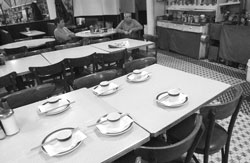By Elizabeth O’Brien
As rumor played tug-of-war with reality last week in Chinatown, community members voiced concern that an outbreak of the SARS virus — actual or perceived — could bring further economic damage to an area already struggling with fears of the illness.
No cases of severe acute respiratory syndrome have been linked to Chinatown to date. But fears of the virus, which spread from southern China throughout the globe, have already cost the local economy an estimated $5 million to $10 million in losses, said Don Lee, a member of Community Board 2 who serves as the volunteer executive director of the Chinatown Community Economic Development Project.
“It’s clear that the rumors and fears of the disease are more damaging than the disease itself,” Lee said.
Over the past month, Chinatown has seen the destructive impact of rumors on its community. In an apparent April Fool’s Day prank earlier this month, a false story was circulated over the Internet that the owner of a Bayard St. restaurant had died of SARS, causing business to drop in eateries throughout Chinatown.
Then last week, after news spread that the manager of the Canal St. branch of Abacus Federal Savings Bank was dismissed and suspected of embezzlement, panicked account holders withdrew more than $2 million even as officials tried to reassure them that their money was insured.
“I’ve been in this country for 30 some years, and I’ve never seen anything like this before,” said John Hung, owner of the May May Gourmet Chinese Bakery on Pell St., referring to the nervous climate in Chinatown.
Community leaders have said that the best way to counter the rumors is to repeat the message that Chinatown is safe. Lee said that civic organizations are looking to place ads to let New Yorkers know that, “Chinatown is a happy, happening place to visit.”
Such reinforcement appears to be needed. Local restaurateurs said that so far, efforts by city officials to boost confidence in the area have not had the desired impact.
Chuen Tang, the owner of Vegetarian’s Paradise at 33 Mott St., said that business did not revive after Mayor Mike Bloomberg had lunch in Chinatown two weeks ago.
“It’s been so quiet,” said Tang, who estimated that his dinner business has been down about 40 percent since the beginning of April.
“If there is medication for SARS, I think then people will come back,” said Nicole Sow, a worker at Vegetarian’s Paradise. “Right now, there’s no medication to control it.”
While there may be more elbowroom in Chinatown restaurants these days, not all diners are staying away.
“All the hype is something for the media to talk about,” said Julie Whitfield of Durham, N.C., who was looking for a place to eat with her husband, Charles. “It’s not something that concerns us at all.”
“We’re looking for SARS specials,” joked Jacob Matsibekker, a bank worker who came with two colleagues for their weekly Chinatown lunch.
The three said they weren’t scared of SARS but added that some of their co-workers were avoiding Chinatown.
On Monday, Manhattan Borough President C. Virginia Fields joined elected and community officials in encouraging people to come to Chinatown and have a meal.
“There’s no reason to be fearful of coming to this area,” Fields said, noting that there have been no SARS cases reported in Chinatown to date.
Many officials agree that the situation in Chinatown is precarious. Alarm has been kept in check — on a recent Friday, no facemasks were spotted being worn on the neighborhood streets — but community leaders acknowledge that this could change if even one case of SARS is traced to Chinatown either through fact or gossip.
“A rumor could close everything down,” said Father Raymond Nobiletti, the Cantonese-speaking pastor of Church of the Transfiguration on Mott St.
Nobiletti said that the church has taken some precautions to reassure its congregation. Worshipers have been asked to receive communion with their hands only, not their mouths, and the church has temporarily suspended the drinking of wine during the service.
These measures have comforted the small number of congregants who have asked about safety during the threat of SARS, Nobiletti said. The church has not experienced a drop in attendance, he added, even though 60 percent of the congregation comes from outside Chinatown.
The community is keeping its fingers crossed, hoping that the SARS scare can be weathered without further damage to an area still hurting from the terror attack of Sept. 11, 2001. The closing of Park Row for security reasons, blocking a major artery linking parts of Lower Manhattan to Chinatown, has limited access to the area and caused business to suffer. Even before the terror attacks, Lee noted, the closing of the Grand St. subway stop for long-term renovations was a big blow to the community.
But these setbacks have had positive results as well, some have noted. Time and again, the community has demonstrated its resiliency. Chinatown has come together and civic involvement is up, community leaders have said, increasing confidence that the neighborhood will soon pull through the SARS scare.
“One thing I’m feeling good about is we’re taking a pounding but we’re hanging tough,” said Paul Lee, a Mott St. merchant.




































